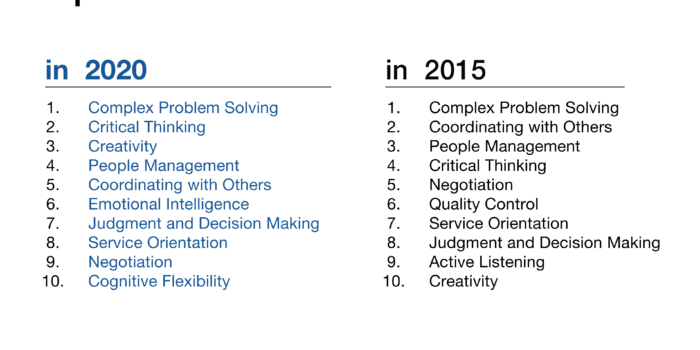Researchers and pundits in the media are predicting the advance of AI and automation with jobs tagged for disappearance. Andrew Ng suggested in 2016 “If a typical person can do a mental task with less than one second of thought, we can probably automate it using AI either now or in the near future,” As these technologies become more advanced and widely rolled out, humans will lose out to software. But in the age of AI, many roles requiring human qualities will come into their own. What does this mean for women and the world of work in general, now that soft skills are hard currency?
Stop calling them soft skills
I even think it’s time to stop calling them soft skills. In previous generations soft skills were not as highly valued as hard skills. As women entered the workplace in ever-increasing numbers their talents were considered to be in the areas of those unquantifiable intangibles such as empathy, communication, listening. This channelled them into pink functions quite often silos, which are removed from the decision-making centres. In recent years behavioural scientists started seeing the connection between soft skills and business success and gave them a bit of an upgrade.
Could it be that in the age of automation and AI, soft skills will even come into their own?
Fourth Revolution
The World Economic Forum published a list of the Top 10 Skills needed for the 4th Revolution. You can see the shift. One item I would query is that Active Listening has been dropped. I don’t understand that at all as from my perspective listening underpins all the other skills.
Jobs and soft skills
We are a long way away from any technology that can genuinely recognize human emotions and respond to them appropriately. Any job that requires emotional intelligence, critical and strategic thinking , vision and creativity are going to be protected in the short-term. Currently we are not at a point that AI and robots can automatically design their own upgrades and create responses to anticipated problems. At the moment they just report and record them. Will this change? Who knows.
In the meantime any job that requires empathy, sympathy, imagination and vision as well as risk assessment will require so called soft skills. This could include primary care physicians, caregivers, coaches, therapists, social work, artists, photographers, entrepreneurs, activists, thought leaders are unlikely to be replaced by technology in the immediate future. Add to the list writers, engineers, inventors, artists, musicians
We will still need a person to make data based decisions and judgements, even if they use software to manage their biases.
Business imperative
Soft skills are not just hard currency for individuals, but a business imperative. A study from Korn Ferry Hay Group, used data from 55,000 professionals in 90 countries. The found that in 11 of 12 emotional intelligence competencies women outperformed men. Research from many sources from McKinsey to Sodexho indicates that emotional intelligence increases with gender balanced and diverse teams.
What is a real flip, for the first time, businesses should pay more attention listening to women, rather than trying to fix them. This what worries me about the WEF report.
Impact on talent management
The arrival of AI will mean that every element of the talent pipeline will be impacted. This will start at identifying talent and following through to promotion and leadership training. In an era when job obsolescence is inevitable, the focus of both individuals and organisations, even schools, has to be on developing soft skills.
If you want to bring top talent into your organisation. Get in touch.






